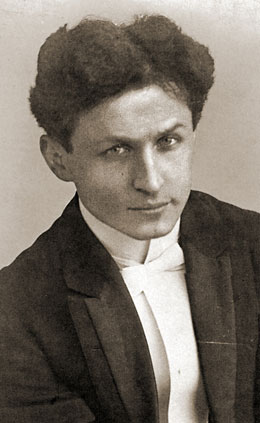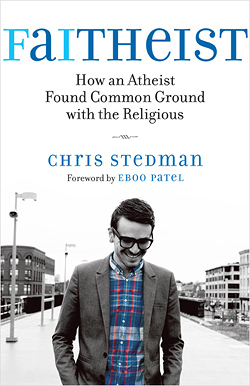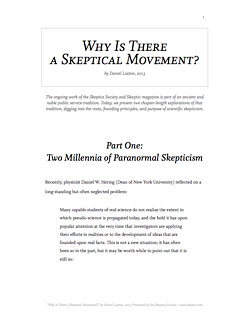Skepticblog
About Daniel Loxton

Daniel Loxton is the Editor of Junior Skeptic (the 10-page kids’ science section bound within Skeptic magazine). He is the author and illustrator of the national award-winning kids’ science book Evolution: How We And All Living Things Came to Be (translated into Slovenian, Korean, Norwegian, and, in a modified form as the separate book Evolução, Portuguese). Evolution won the 2010 Lane Anderson Award recognizing the best Canadian science book for young readers. It has also been named a finalist for the Norma Fleck Award (recognizing the best Canadian nonfiction book for young readers) and the Ontario Library Association’s prestigious Silver Birch Award. Daniel is also the author and illustrator (with Jim W. W. Smith) of Ankylosaur Attack, a paleofiction storybook for ages four and up. This is the first book in the “Tales of Prehistoric Life” series from Kids Can Press. Daniel has written for critical thinking publications including Skeptic, Skeptical Briefs, eSkeptic and the Skeptical Inquirer, and contributed cover art to Skeptic, Yes mag, and Free Inquiry. In a previous career, Daniel was a silvicultural shepherd for ten years (working mostly along the BC side of the Alaska panhandle).
RSS feed for this authorwww.skeptic.com/junior_skeptic
Junior Skeptic Facebook page
Subjects
aliens alternative medicine atheism autism belief bigfoot Brian Dunning CAM Carl Sagan climate change conspiracy theories Creation creationism critical thinking cryptozoology denialism dinosaurs Dr. Kiki earthquakes economics education environment ethics evolution fossils geology Ghost Hunting ghosts global warming God homeopathy intelligent design james randi journalism media medicine michael shermer morality nasa paleontology paranormal politics pseudoscience Psychics psychology religion science science denialism scope SETI Shermer skeptical history skepticism skeptoid Skeptologists TV ufo ufos vaccines videoRecent Comments
- Daniel Loxton commented on A Fond Farewell to Skepticblog at 1:25 pm, September 18, 2014
- markx commented on A Fond Farewell to Skepticblog at 8:52 pm, September 17, 2014
- Thomas commented on False Equivalence at 11:44 am, September 15, 2014
- John Greg commented on A Fond Farewell to Skepticblog at 2:10 pm, September 13, 2014
- tmac57 commented on A Fond Farewell to Skepticblog at 10:39 am, September 13, 2014
Read posts by author:
That Time Houdini Threatened to Shoot All the Psychics
 As a magician, Harry Houdini was a trickster pretty much by definition—and, of course, a good one. He was quick to turn mere happenstance to his advantage (as when he commanded the rain to stop and begin again at a Fourth of July party)1 and to turn people’s assumptions against them. Sometimes, the results of such trickery were simple delight. Sometimes, as in his exposures of fraudulent psychics, his craftiness served the public good. On other occasions, Houdini’s performances had more tragic consequences. Such was his own assessment of mentalism performances he gave earlier in his career, in the guise of a medium:
As a magician, Harry Houdini was a trickster pretty much by definition—and, of course, a good one. He was quick to turn mere happenstance to his advantage (as when he commanded the rain to stop and begin again at a Fourth of July party)1 and to turn people’s assumptions against them. Sometimes, the results of such trickery were simple delight. Sometimes, as in his exposures of fraudulent psychics, his craftiness served the public good. On other occasions, Houdini’s performances had more tragic consequences. Such was his own assessment of mentalism performances he gave earlier in his career, in the guise of a medium:
At the time I appreciated the fact that I surprised my clients, but while aware of the fact that I was deceiving them I did not see or understand the seriousness of trifling with such sacred sentimentality and the baneful result which inevitably followed. To me it was a lark. I was a mystifier and as such my ambition was being gratified and my love for a mild sensation satisfied. After delving deep I realized the seriousness of it all. As I advanced to riper years of experience I was brought to a realization of the seriousness of trifling with the hallowed reverence which the average human being bestows on the departed, and when I personally became afflicted with similar grief I was chagrined that I should ever have been guilty of such frivolity and for the first time realized that it bordered on crime.2
Which brings us to another deception that was “a lark” and yet “bordered on crime”: the time that Houdini, according to his lifelong pal Joseph Rinn, conspired to issue a pseudonymous, implied, hoaxed threat against materializing mediums (the subset of psychic performers who purport to be able to summon ectoplasmic manifestations of the spirits of the dead). I must confess that I found this story quite funny on first read—and yet, schadenfreude aside, it also strikes me as a deeply unethical example of skeptical activism.
comments (32)Announcing My New Book, Pterosaur Trouble
Hi, folks! I’m excited to announce that my brand new children’s paleofiction storybook Pterosaur Trouble is hitting stores, with both Amazon.com and Amazon.ca now listing it as “in stock.” (The official release date is April 1st. Other vendors, including my own home-team headquarters on the web, the Skeptics Society’s Skeptic.com, will have it in stock in the coming weeks.) (continue reading…)
comments (4)Quick Bigfoot DNA Update
The internet was buzzing yesterday with the long-anticipated1 release of a paper purporting to present DNA evidence that “conclusively proves that the Sasquatch exist as an extant hominin and are a direct maternal descendent of modern humans.”2 With DNA sourced, according to the paper, from among “One hundred eleven samples of blood, tissue, hair, and other types of specimens,” this is the most prominent Sasquatch DNA case to date.
Full expert review of the team’s data and methods should emerge in the coming days. In the meantime, science writers identified several serious red flags within hours of the paper’s release.
comments (40)
New Release:
“Why Is There a Skeptical Movement?”
Following on the themes of my previous post (riffing on Steve Novella’s recent debunking of some of the oldest clichés about scientific skepticism) I’m pleased to announce that the Skeptics Society released my latest project yesterday in our eSkeptic newsletter:
For over twenty years, the Skeptics Society and Skeptic magazine have labored at the forefront of the skeptical movement—constantly experimenting, often pushing the boundaries, but always circling back to the heart of the skeptical tradition. …
This week, we’re pleased to present Daniel Loxton’s challenging and provocative new project, “Why Is There a Skeptical Movement?” (PDF). Almost two years in the writing, these two meticulously-researched chapter-length explorations dig deeply into the roots, founding principles, and purpose of scientific skepticism.
It’s a whopper (almost 24,000 words, counting the endnotes) and a labor of love. I hope you enjoy it!
DOWNLOAD “Why Is There a Skeptical Movement?” PDF
Comments OffSteven Novella Takes On Some of the Oldest Clichés About Scientific Skepticism—Again
Skepticblog’s Steven Novella has an interesting post up at Neurologica this morning, in which he addresses some issues of conflation between scientific skepticism and other movements or interests. Specifically, Novella discusses the very old (and demonstrably false) complaint that scientific skepticism refuses to “take on” religious claims, and the similarly perennial complaint that skeptics ought to get into the business of political claims.
On religion, he emphasizes once again the same point he has made throughout his career (a point on which I precisely agree, and which has for decades been the practical, time-tested, virtually universal position of scientific skepticism as a movement):
comments (19)This one will simply not go away. No matter how many times I clarify and re-clarify my position on religion and skepticism the framing of the issue by those who think skepticism should address matters of faith does not change, which implies to me that they are not really listening. I know PZ is not specifically addressing me here, and there are true accommodationists out there (those who think religious thinking and scientific thinking are compatible and should be integrated), but since he is talking about prominent skeptics he should at least address what every prominent skeptic I know (Eugenie Scott, Massimo Pigliucci, Michael Shermer, Joe Nickell, and others) who shares my position has to say on this matter.
Here it is (again) – The issue is not with religion or religious-based claims. We address them all the time (creationism, miracles, faith healing, separation of church and state, secular moral philosophy, etc.) Really – we are right there shoulder to shoulder with organized atheists taking on every such issue. It is NOT that religious claims are untestable (some are, some aren’t), it is only that when claims (religious or otherwise) are framed as untestable then they are matters of faith and not science.
Same Darkness, Same Light
I had a post ready to go for this morning on the topic of early twentieth century skeptical activist Joseph F. Rinn; but at a couple of thousand words, I thought it might be more appropriate for next week’s eSkeptic, our free weekly email newsletter over at the Skeptics Society. (You can subscribe to eSkeptic here.) Like my last post on the surprisingly complicated history of the skeptical slogan “extraordinary claims demand extraordinary evidence,” my current Junior Skeptic article about second century Roman debunker Lucian of Samosata, and my next Junior Skeptic about two especially hard core early twentieth century skeptical investigators who happened to be women, the new Rinn piece is part of larger exploration I’ve been doing of the skeptical work of the decades, centuries, and even millennia prior to 1976 (the year of the formation of CSICOP, now called CSI—a moment which is usually considered the birth of the fully modern skeptical movement).
The skeptics of previous eras faced a few wrinkles unique to their contexts. How could they not? Yet the more striking thing is how very much repeats over time. The mysteries are the much same, decade after decade, and often identical. The arguments, the exposés, the scams, the rhetoric, and the sense of unique moral urgency—of sliding into a new Dark Age—all these echo across generations. For all the fine mustaches of the early twentieth century skeptical scene (and man, those were some damn fine mustaches) these were people whose mission and challenges were much the same as my own. The sense of continuity this historical perspective brings is—palpable? illuminating? remarkable?
As my intended post has gone to another home, I’d like to share with you an amusing if trivial example: in many eras, skeptics have suggested that it may be a bad idea to investigate mysteries in the freaking dark.
comments (11)Wonderful Phenomena Demand Wonderful Evidence
Growing up in a family of silvicultural contractors, much of my parents’ dinner table conversation revolved around the low bid system, which made the treeplanting industry a deeply exasperating, boom-and-bust roller-coaster. The challenge was how to work out bids which would cover the costs of the work and allow us to keep a roof over our heads through the winter, while also somehow outbidding people who didn’t know how to do that. Maddeningly, startup treeplanting companies were constantly jumping in with an incomplete appreciation of the complexity and risks (and therefore true costs) of running large contracts. The inexperienced routinely underbid the experienced—leaving us hungry—and then went promptly out of business. So I grew up with the lesson that things are always more complicated than they look at first glance—a lesson my work in skepticism has never failed to confirm.
At art school, I learned another lesson no less applicable to understanding paranormal and fringe claims: originality isn’t really a thing. Too many people have been sharing ideas for too long to support the conceit that our own ideas offer much in the way of substantial novelty.
I’m reminded of both lessons right now, as my research takes me a little deeper into skeptical history. Case in point: the well known and often repeated skeptical slogan, “Extraordinary claims demand extraordinary evidence.”
comments (18)Thoughts on Chris Stedman’s Faitheist
 I’m drinking my morning coffee as I write this, and thinking about a moving, thought-provoking book I’ve been reading for pleasure: humanist interfaith activist Chris Stedman’s Faitheist: How An Atheist Found Common Ground with the Religious.
I’m drinking my morning coffee as I write this, and thinking about a moving, thought-provoking book I’ve been reading for pleasure: humanist interfaith activist Chris Stedman’s Faitheist: How An Atheist Found Common Ground with the Religious.
I try to follow a number of firm guidelines for my writing at skeptical platforms like Skepticblog. One is never to talk about anything unless I’ve given that thing a thorough look myself—read the book, seen the movie, tracked down the paper, whatever. Another is to keep my personal politics, humanism, and atheism out of my skeptical writing as much as possible. After all, skepticism is not a private clubhouse for people who share my personal values and opinions; it’s a shared workspace for people of many backgrounds to pursue the useful practical task of investigating fringe science and paranormal claims. (Believe this, don’t believe that—who cares? Science and skepticism are about what we can find out.)
But I’m not a robot. I believe stuff. I enjoy stuff. So today I thought I might break my own guidelines and share a few preliminary personal thoughts about an atheist book I haven’t finished reading, but which I am savoring.
comments (68)Houdini, Bigfoot, and the Jackson Pollock Effect
Recently Skeptical Inquirer writer Benjamin Radford posted a question to the Facebook Group thread for Skeptic magazine’s cryptozoology-themed podcast MonsterTalk on the topic of the infamous Patterson-Gimlin film (purported to show a sasquatch striding across a sandbar in the woods). What are we to make, Radford wondered, of claims that the film cannot be duplicated because it would be too expensive, too difficult technically—or perhaps even impossible to recreate due to the anatomical limits of human actors? I responded to say that all such arguments are in my opinion baloney, but that this does not necessarily imply that attempts to recreate the film to the satisfaction of fair viewers actually ever will succeed. Even if the original was a crude hoax accomplished by cheap, simple means (as I suspect) it may still be the case that it can never be matched.
The reason goes well beyond Patterson or Bigfoot or cryptozoology, and right to the heart of artistic creation. It’s a truth I learned in painting and photography, a truth I live with every day in my work as as a writer and illustrator: sometimes you just get lucky. Sometimes things just work. There’s no great reason for it, no secret key you can turn a second time. Sometimes lightning strikes—and then it is gone. As an artist you seize those moments of magic, knowing you cannot get them back.
comments (9)Hosted by Skeptic magazine. For website-related matters, contact the webmaster.


As some readers know, I try pretty hard to keep my personal atheism and humanism out of my work in skepticism. Generally I don’t discuss those topics from skeptical platforms like Skepticblog, unless it is to discuss the historical and conceptual boundaries between parallel rationalist movements. Scientific skepticism just isn’t the appropriate platform for me to promote or evangelize for my personal non-scientific theological beliefs. When I do talk about atheism, it is usually in the context of arguing, as I do at length in my recent two-chapter piece “Why Is There a Skeptical Movement?” (PDF) that conflation between atheism and skepticism misrepresents the ongoing religious diversity of the skeptical community and misdirects or erodes the important work that the skeptical movement was organized to pursue.
But today I want to take off my skeptic’s hat again for a moment, and write here instead in my personal capacity as an atheist. I hope you’ll forgive the digression.
(continue reading…)
comments (51)